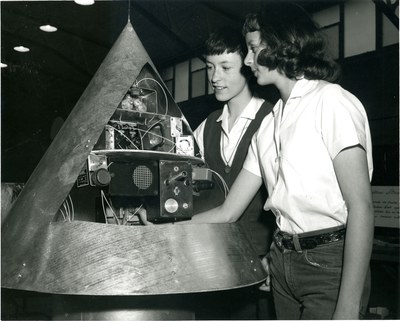Everyday People: The Photography of Clarence E. Redman

Clarence E. Redman. Sandra Tucker and Judy Sesock work with their satellite nose cone prototype project at Jackson Junior High School in 1960. Albuquerque Museum Photo Archives. PA1997.055.497
Clarence Eugene Redman, a pioneering mid-20th Century Albuquerque commercial photographer, worked for newspapers and an ad agency before setting up his own commercial studio in 1933. Over the next three and a half decades, Redman would capture the wide array of activities that made up everyday life in Albuquerque.
From the Albuquerque Museum Photo Archives permanent collection.
BIOGRAPHY
Clarence Eugene (C.E.) Redman was born December 7, 1898 in Irvington, Kentucky. The oldest of three children, C.E. grew up in Alamosa, Colorado, where his father worked for the railroad. At 19, C.E. joined the Army and served during World War I. Upon his return, he became a brakeman with the Denver and Rio Grande Railway. He met and married a music teacher from Kansas named Bess Curry and they settled in Alamosa. The Redmans had two children, Jack and Jean.
In 1928, the family moved to Santa Fe, New Mexico, and two years later, to Albuquerque. C.E. worked with the Ward Hicks Advertising Agency and Bess accepted a position with the University of New Mexico’s music department. C.E. was a fun and easy-going man, whose pleasant demeanor helped him make friends. He and Bess routinely held tea parties and informal dinners for friends. Dan Burrows, editor of the Albuquerque Tribune, was one of Redman’s closest friends. Lively stories of Redman’s vacations, family events, and friendly jabs were published in the editorials for decades.
In 1942, C.E. joined the US Army Air Corps, becoming a veteran of both World Wars. He then returned to Albuquerque to set up his first commercial photography studio on E. Gold Avenue. He spent the next thirty years working to capture the life events, big and small, of Albuquerque citizens.
Redman’s son Jack and daughter Jean both married and had children of their own, raising their families in Albuquerque. Jack became a physician and led the medical staff at Presbyterian Hospital. Jean became a private pilot and flight instructor.
C.E. Redman died in Albuquerque on January 12, 1970. He is buried in Santa Fe National Cemetery. In a tribute, the Albuquerque Tribune wrote: “For many years, Redman was probably Albuquerque’s leading commercial photographer. In that role, he photographed countless school students, brides and grooms and others. And he photographed them well, for Redman was a skillful cameraman. […]We have lost a friend. And Albuquerque has lost one too, as well as a fine photographer and an outstanding member of the community.”
CAREER
Developing a Vocation
Clarence Eugene (C.E.) Redman began his career in New Mexico as an advertising manager at the Santa Fe New Mexican in 1928. In 1930, he moved his family to Albuquerque and worked for the Ward Hicks Advertising Agency. It was with Ward Hicks that C.E. began working as a photographer in earnest, creating promotional materials for businesses around the city.
In 1933, C.E. set up an advertising agency of his own on Central Avenue. Throughout the 1930s, Redman would hone his photography skills, describing the evolution of his work to the Albuquerque Journal in 1938: “[I] used to just point the camera and let it click but now, oh it’s very different. First you measure the distance, then the timing, to say nothing of the exposure and focus, angle, position.” Redman would shoot hundreds of photographs to get the picture he wanted. He was in demand throughout the city, his photographs appearing in most editions of the newspapers and in “Albuquerque Progress”, a monthly business journal. He made a point of identifying his subjects and providing background details and quotes, adding value to his photographs.
It wasn’t until after WWII that C.E. set up his first commercial photography studio on E. Gold Avenue. Redman photographed community events for the New Mexico State Fair and Albuquerque Public Schools, worked for the newspapers, used his studio for portraits, and now was being hired for weddings, business events, and graduation ceremonies.
In April 1952, Redman found himself on the other side of the camera lens, as the subject of a LIFE Magazine article. On his way to photograph a wedding, C.E. stopped at a red light and saw two flying saucers hovering over Tijeras Canyon, east of the city. LIFE Magazine interviewed and photographed him for an article entitled “Have We Visitors from Space?” in which the magazine highlighted 10 UFO sightings and had the Air Force evaluate them. Redman’s sighting was supported by a second person in a different area of Albuquerque, and the Air Force had no record of government aircraft in the area at the time.
As Redman’s photography career continued to grow, he became a leader in the field. By the late 1950s, he was attending national conferences as the New Mexico delegate for commercial photographers. He would continue helping to tell the stories of Albuquerque citizens through his photographs until his death in 1970.
